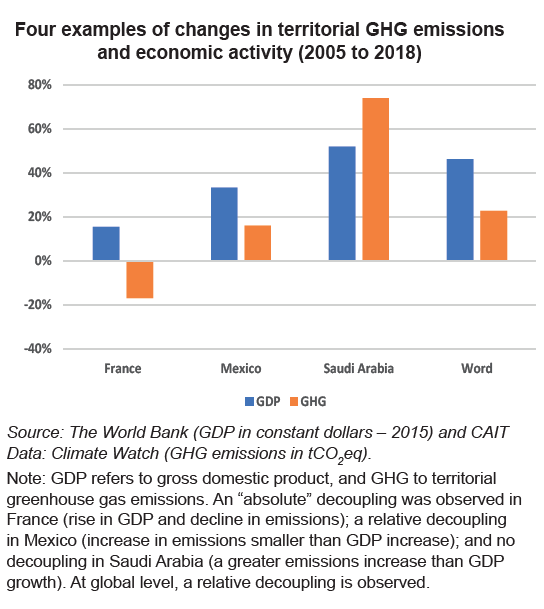Economic Growth and Decarbonisation
A rapid and massive reduction in greenhouse gas emissions must make it possible to limit the effects of climate change. The success of decarbonisation will depend on the implementation of appropriate public policies aimed at reorienting the decisions of economic actors and supporting them. Given the uncertainties and complexity of the economic issues at stake, the understanding of the economic effects of decarbonisation must be further strengthened through evaluation work.
In all sectors (manufacturing, construction, transportation etc.), economic activity goes hand in hand with greenhouse gas (GHG) emissions. However, the carbon intensity of such activity – the quantity of emissions generated by unit of production – can vary, depending on the technology used for example. While economic activity has decoupled from territorial emissions in some countries in the past few years, achieving climate change mitigation objectives will require a faster and more significant cut in emissions. Therefore, a more extensive decoupling is needed to preserve economic growth (see Chart), and it has to take into account imported GHG emissions too.
Public policy measures will be needed to drastically reduce GHG emissions. Environmental policies seek to encourage or compel economic agents to change their practices and shift their investments to emission-free or low-emission activities. Various types of instruments can be deployed to this end, including carbon pricing, regulation and public funding.
From a macroeconomic perspective, the transition to net-zero emissions could primarily have a twofold effect: a rise in the relative price of GHG emissions and a sharp increase in decarbonisation investments. The macroeconomic impact of the transition remains very uncertain, yet it is a subject addressed in a growing body of work. Even though this twofold effect could hamper economic growth and increase inflation during the transition phase in certain scenarios, the cost of the transition would remain well below the cost of inaction.
In particular, the economic impacts during the transition phase depend on the frictions and the adjustment costs in the economy. Decarbonisation policies could be implemented alongside measures that aim to support the most vulnerable agents to mitigate the transition’s negative impacts. In this respect, vocational training policies are key to ensuring job reallocation.
